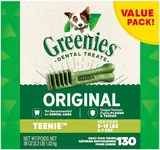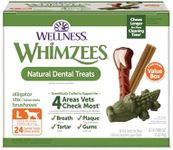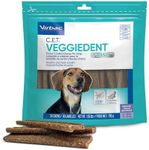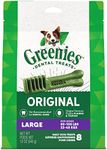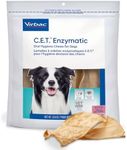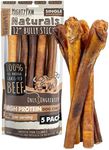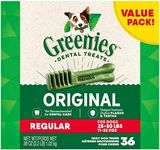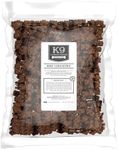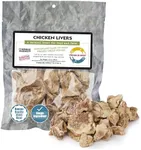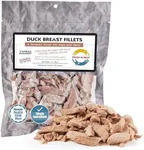Buying Guide for the Best Dental Treats For Dogs
Choosing the right dental treats for your dog is essential for maintaining their oral health, preventing bad breath, and reducing the risk of dental diseases. Dental treats can help clean your dog's teeth, massage their gums, and provide them with a tasty reward. When selecting dental treats, it's important to consider various factors to ensure they are effective and safe for your furry friend. Here are some key specifications to look out for and how to choose the best fit for your dog.Size and ShapeThe size and shape of dental treats are crucial because they need to be appropriate for your dog's size and chewing habits. Small dogs need smaller treats that they can easily chew, while larger dogs require bigger treats that can withstand their stronger jaws. The shape should encourage chewing and help clean teeth effectively. Look for treats that are designed to reach different areas of the mouth, including the back teeth.
IngredientsIngredients are important because they determine the treat's nutritional value and safety. Avoid treats with artificial colors, flavors, and preservatives, as these can be harmful to your dog. Look for natural ingredients and those that are specifically formulated to promote dental health, such as enzymes that help break down plaque. If your dog has any allergies or dietary restrictions, make sure to choose treats that accommodate those needs.
TextureThe texture of dental treats plays a significant role in their effectiveness. Treats with a firm, chewy texture can help scrape away plaque and tartar as your dog chews. However, they should not be too hard, as this can damage your dog's teeth. Soft treats may not be as effective in cleaning teeth but can be suitable for older dogs or those with dental issues. Choose a texture that matches your dog's chewing strength and dental health.
FlavorFlavor is important because it determines whether your dog will enjoy the treat and be motivated to chew it. Common flavors include chicken, beef, and peanut butter. If your dog is picky, you may need to try a few different flavors to find one they like. The treat should be tasty enough to keep your dog interested but not so rich that it upsets their stomach.
Dental Health BenefitsLook for dental treats that offer specific dental health benefits, such as reducing plaque and tartar buildup, freshening breath, and promoting healthy gums. Some treats are endorsed by veterinary dental associations, which can be a good indicator of their effectiveness. Consider your dog's current dental health and choose treats that address their specific needs, whether it's preventing plaque or maintaining already healthy teeth.
Caloric ContentCaloric content is important to ensure that the treats do not contribute to weight gain, especially if your dog is on a controlled diet. Check the calorie count per treat and factor it into your dog's daily caloric intake. If your dog needs to lose weight or maintain a healthy weight, opt for low-calorie dental treats. Always balance treat intake with regular meals to avoid overfeeding.
